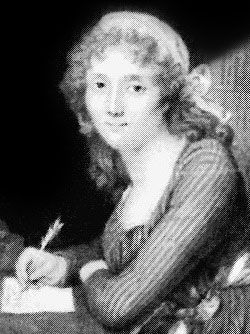Olympe de Gouges' Declaration
of the Rights of Woman provides an interesting view on how women in
the Enlightenment and French Revolution viewed one another. Something that I
find really interesting in her writing is her sharpness towards other women.
While much of what we have been reading has placed the blame of female
subjugation on man, Olympe de Gouges takes this a step further and also places
blame on women, as can be seen in the postscript: "Women have done more harm
than good" (Declaration of the Rights of Woman). In this
proclamation, she is referencing women in the old regime (the monarchy),
specifically the nobility. Her contempt to such women is obvious with the
statement: "A woman only had to be beautiful and amiable; when she
possessed these two advantages, she saw a hundred fortunes at her feet. . . The
most indecent woman could make herself respectable with gold"
(Postscript Declaration on the Rights of Woman). Considering
her background as a self-educated butcher's daughter, it is easy to see where
this resentment could have arisen from. Women who had more opportunities than
she did were, in her opinion, wasting them. She then chastises these women
for their relative inactivity during the Revolution and even probably the
Enlightenment with statements such as: "Oh women! Women, when will you
cease to be blind? What advantages have you gathered in the Revolution?"
(Postscript Declaration of the Rights of Woman). And
she finally urges them to take matters into their own hands: "Women, wake
up; the tocsin of reason sounds throughout the universe; recognize your
rights" (Postscript Declaration of the Rights of Woman). As we
discussed in class, her declaration is riddled with enlightened phrases, such
as universe, nature, and reason.
I
think what I like most about Olympe de Gouges is her ability to speak her mind,
and her desire not only to criticize men, but also women. I agree with her
sentiment that women were partially responsible for not obtaining the equality
they desired. While we might consider this as a hindrance in gaining support
from her female peers, it may have been seen as a much needed wake-up call for
these women. Though there is some debate about whether Olympe de Gouges can be
considered a full feminist, by the standards stated in class – recognizing the
inequality between genders and then trying to rectify it – she certainly qualifies
in my opinion.
Source Used: http://chnm.gmu.edu/revolution/d/293/


1 comment:
McKenzie, I like your frequent usage of quotes to elaborate your argument. While reading your post, Olympe de Gouges reminded me a lot of Laura Cereta who was also critical of her own sex during the fifteenth century. For example in one of her letters she wrote, "women have been able by nature to be exceptional, but have chosen lesser goals. For some women are concerned with parting their hair correctly, adorning themselves with lovely dresses, or decorating their fingers with pearls" (class 47). It is interesting how this female author also touched on themes such as nature, reason, and free will which we see evident in publications from the eighteenth century. Cereta also wrote a letter dressed to women titled "Against Women who Disparage Learned Women." In this letter she states, "It is easier to forgive men of their foolish opinions than it is to bear the babbling and chattering women, glowing with drunkenness" (cp 54). The two female writers share many similarities however the main difference is that Cereta was arguing for women's right to be educated and de Gouges is concerned with furthering the rights of women as citizens.
Post a Comment